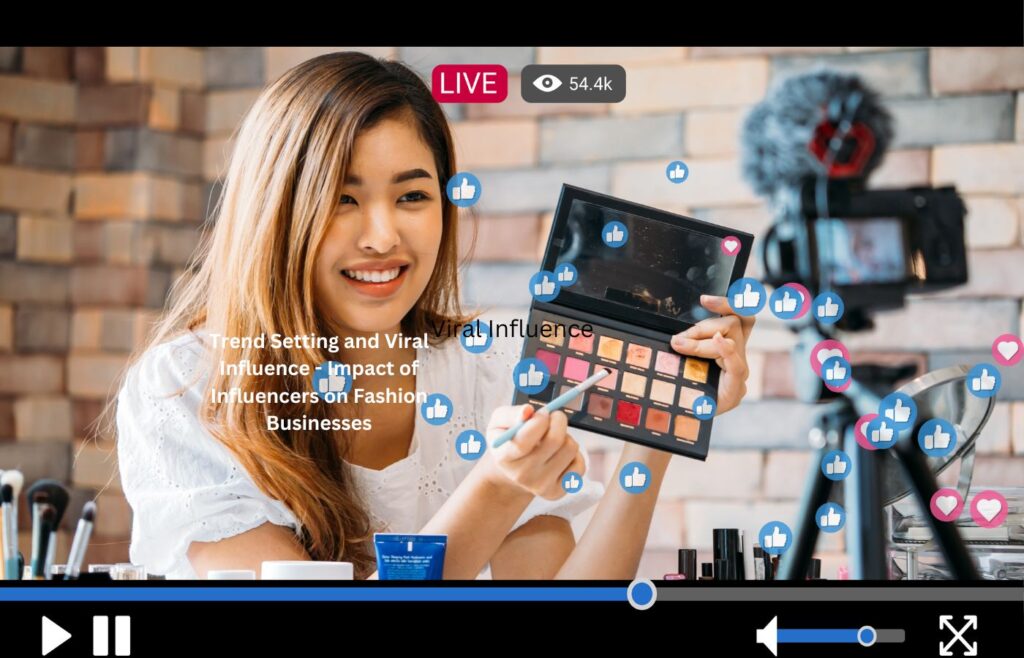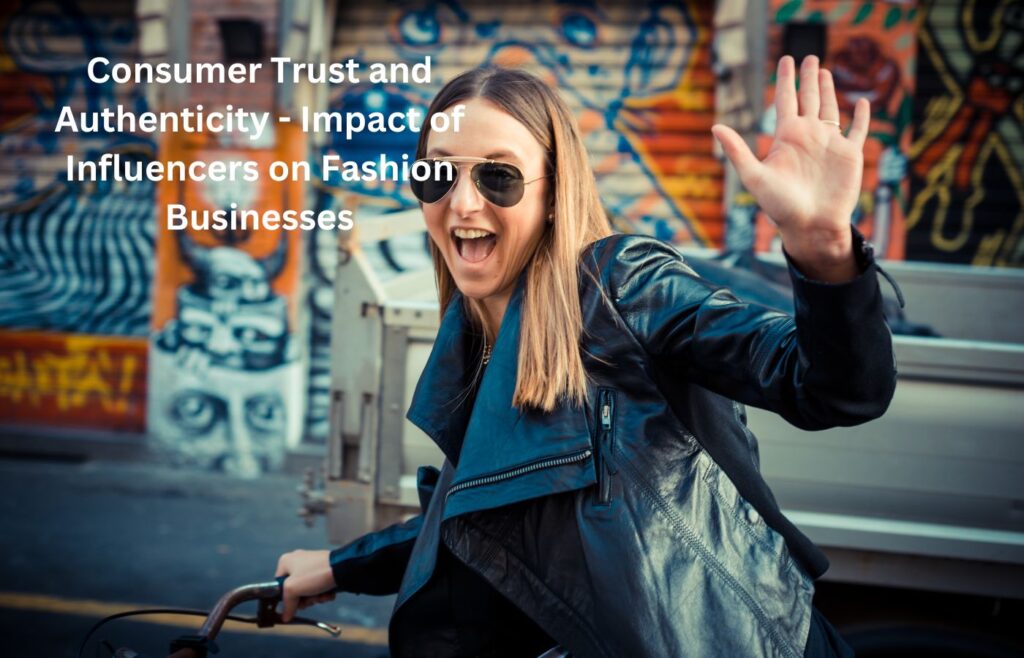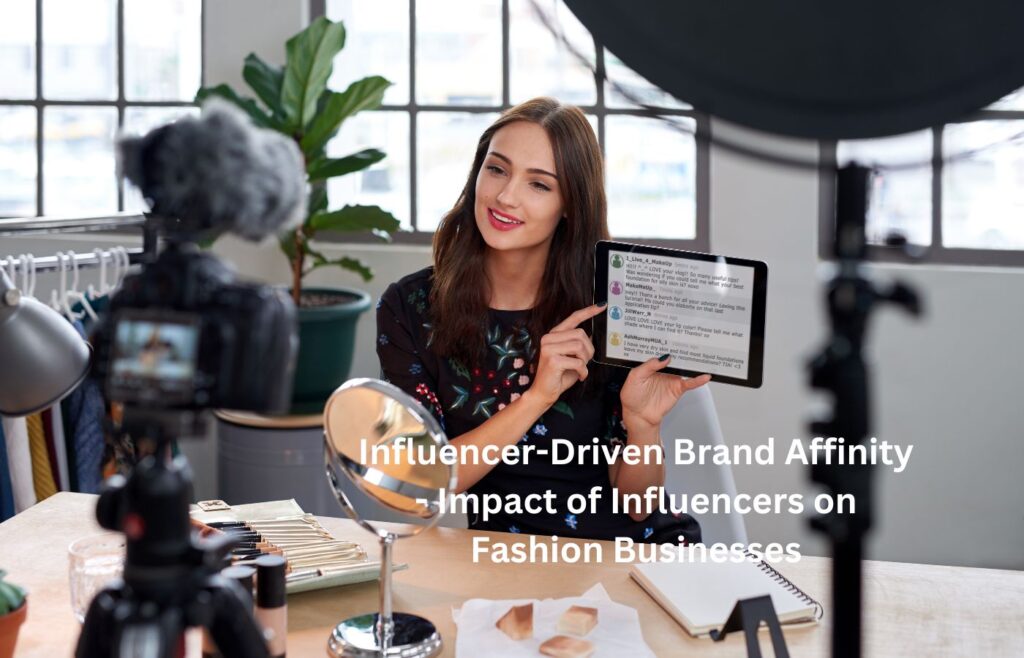Introduction – Impact of Influencers on Fashion Businesses
Within the ever-evolving fashion business landscape, influencers have not just transformed marketing strategies and consumer behavior, but they have also reshaped the dynamics of the industry. Their significant reach and persuasive impact on social media platforms make them invaluable tools in driving trends, raising brand visibility, and forging authentic connections between brands and audiences. This introduction delves into the significant impact of influencers on fashion businesses, highlighting their transformative power in shaping industry dynamics, a power that is often underestimated.
Influencer marketing marks an evolution towards more personalized and relatable forms of advertising. Instead of conventional advertisements, influencer marketing leverages the credibility and authenticity of individuals with established fan bases based on their style, expertise, or personality – more tailored toward younger generations who value transparency, authenticity, and peer recommendations in purchasing decisions.
Influencers have quickly become the go-to experts on fashion trends, introducing exciting and visually engaging content for their audiences to enjoy. Their ability to craft aspirational yet accessible narratives around fashion brands has catapulted influencer collaborations into one of the primary marketing strategies within this sector.
Influencers are not just players in the fashion industry, they are game-changers. They play a crucial role in increasing brand recognition and engaging consumers, offering fashion businesses substantial benefits. By strategically aligning with influencers whose values align with theirs, fashion businesses can reach target demographics and cultivate brand loyalty among digitally native customers.
This introduction not only sets the stage for exploring the multidimensional influences on fashion businesses, from trend-setting and brand affinity to sales performance and industry innovation but also looks ahead to the transformative potential of influencers. By digging deeper into these aspects, we can unmask their transformative potential as drivers of future marketing practices and consumer relationships and the impact of influencers on fashion businesses.
Trend Setting and Viral Influence – Impact of Influencers on Fashion Businesses

Trend-setting and viral influence in fashion have experienced immense transformation since the advent of influencers on social media platforms and the impact of influencers on fashion businesses. These individuals serve as powerful agents of fashion trends and viral moments through their curated content and captivating storytelling.
Influencers utilize their platforms to showcase unique styles, outfit combinations, and fashion aesthetics to their followers. By providing fashion in a relatable and aspirational manner, influencers capture the attention and admiration of their audience members while inspiring them to adopt new trends and styles.
Influencers play an integral part in setting trends. By recognizing emerging signals from global fashion events, street styles, and designer collections—like global fashion events or street styles—they interpret them and translate them into accessible content that resonates with their followers. Via photos, videos, fashion tutorials, etc., they create narratives around particular trends to increase visibility within the fashion community and spread them among their followers.
Viral influence occurs when influentials use unique styling techniques, participate in viral challenges, or showcase eye-catching pieces that garner widespread interest across social media platforms. Such viral moments can reach a global audience and spur rapid trend adoption.
Collaborations between fashion influencers and brands further boost trend-setting and viral influence. By teaming up with influencers, fashion brands gain access to their engaged audiences and take advantage of their ability to generate excitement around upcoming collections or product releases.
Influencers are essential in shaping fashion trends, driving consumer behavior, and propelling brands into the limelight through viral influencer marketing strategies on social media.
Enhanced Brand Awareness and Exposure -Impact of Influencers on Fashion Businesses

Fashion businesses benefit significantly from working with influencers in the digital era. Influencers can expand their reach thanks to their vast and engaged audiences while authentically engaging new audiences and the impact of influencers on fashion businesses.
Fashion brands can significantly boost their social media visibility through influencer partnerships. Influencers, with their engaging content and large followings, showcase products, styles, and brand messages to their followers. This exposure gives fashion brands access to an audience they wouldn’t usually reach through traditional advertising channels, instilling confidence in the effectiveness of influencer partnerships.
Influencers are essential in building brand credibility and authority within the fashion community. When endorsing products or brands, they lend social proof, authenticity, and increased trust from their followers, strengthening consumer affinity and brand perception.
Influencer collaborations allow brands to target specific niche markets and demographics more effectively. By teaming up with influencers whose aesthetics align with their values, fashion businesses can engage highly relevant communities while driving brand recognition and increasing meaningful connections and conversions.
Influencer-generated content tends to live longer than traditional ads, as followers engage with and share it, increasing brand messaging beyond the initial posts. This amplifying effect contributes to greater brand exposure within digital environments.
Influencer collaborations give fashion brands greater brand exposure and awareness, helping them reach wider audiences, establish credibility with consumers, and form meaningful relationships with them. Leveraging influencers’ reach and power helps businesses strategically position themselves within the competitive market and boost long-term brand growth.
Consumer Trust and Authenticity – Impact of Influencers on Fashion Businesses

Trust is critical in driving successful influencer marketing campaigns within the fashion industry, and influencers’ genuine connections and relatable content play an integral part in cultivating it among their followers and creating authentic relationships between themselves and consumers and the impact of influencers on fashion businesses.
Consumer trust is a cornerstone of successful influencer marketing campaigns within the fashion industry. Influencers’ genuine connections and relatable content play an integral part in cultivating this trust among their followers, creating authentic relationships between themselves and consumers. This emphasis on trust and authenticity reassures the audience about the ethical practices in the industry.
Authenticity can also be demonstrated through influencer values aligning with their brand. Consumers appreciate influencers who authentically endorse products that suit their personal style, values, and lifestyle choices; such endorsement creates a genuine connection between an influencer, their brand, and consumers, building trust and, ultimately, loyalty over time.
Transparency is also integral to retaining consumer trust in influencer marketing. Influencers have increasingly become transparent regarding sponsored content, clearly disclosing partnerships or sponsorship relationships to their followers and providing all pertinent details regarding them. This helps build credibility while providing essential insight into whether recommendations from influencers are reliable.
Trust and authenticity are integral to building long-term brand relationships and positive consumer associations. Consumers tend to support brands that align with their values, especially if endorsed by credible influencers.
Trust and authenticity are foundational components of successful influencer marketing in fashion. By prioritizing transparency, authenticity, and genuine relationships, influencers can build trust among their followers, fostering meaningful engagement that benefits both brands and consumers and the impact of influencers on fashion businesses.
Generating Sales and Conversions – Impact of Influencers on Fashion Businesses

Influencer marketing initiatives within the fashion industry often achieve sales and conversions as their intended outcome. Influencers have an extraordinary power to influence consumer purchasing behavior through authentic recommendations and engaging content, ultimately resulting in tangible business results and the impact of influencers on fashion businesses.
Influencers drive sales through direct product promotions or collaborations with fashion brands. They showcase fashion items, accessories, or collections within their content to provide customized styling tips and recommendations that resonate with their followers. This encourages more purchase decisions as followers are drawn into influencer endorsements that seem both relatable and aspirational.
Influencers also help drive conversions by creating urgency and exclusivity around featured products. Limited-time promotions, discount codes, or exclusive offers curated by influencers encourage followers to act immediately and make purchases – incentivizing impulse buys and increasing conversion rates.
Influencers also help followers discover and consider new products through exposure to new brands, styles, or trends introduced by influencers. By expanding consumer awareness and encouraging purchase intent among their followers, influencers expand consumer knowledge while inspiring purchase intent. Followers trust influencers to curate products that match their preferences well, allowing for more informed purchasing decisions that feel confidently satisfying.
Measuring the impact of influencers on fashion businesses on sales and conversions requires monitoring key performance indicators like click-through rates, conversion rates, and attributed sales. This data-driven approach allows fashion brands to measure the return on investment from influencer collaborations and optimize future strategies to drive revenue while maximizing conversions.
Influencers play an integral part in driving sales and conversions for fashion businesses by using their influence, credibility, and engagement with followers to instigate purchase decisions among them. By strategically partnering with influencers and harnessing their persuasive power, brands can increase sales opportunities while realizing tangible business results within an increasingly competitive fashion market and the impact of influencers on fashion businesses.
Innovation in Marketing Strategies – Impact of Influencers on Fashion Businesses

Influencers have enormously impacted marketing strategies within the fashion industry, inspiring brands to adopt innovative approaches to engage their target consumers and remain ahead of industry trends and the impact of influencers on fashion businesses.
Influencers have played an instrumental role in shaping more experiential and engaging campaigns. They collaborate with brands to design immersive experiences such as virtual fashion shows, live Q&A sessions, or try-on sessions using Augmented Reality technology—activation methods that not only captivate audiences but also offer brands an effective platform to demonstrate products in new and engaging ways.
One innovation is increased user-generated content (UGC) and community initiatives. Influencers encourage their followers to participate in hashtag challenges, styling contests, and brand events hosted by fashion brands – creating an inclusive sense of community around these brands while producing authentic content that strengthens brand affinity and loyalty among participants.
Influencers also inspire brands to diversify their content formats and delivery channels, from short videos on TikTok to long tutorials on YouTube. Influencers utilize various platforms to reach different audiences while meeting ever-evolving consumer preferences and maximizing brand visibility and engagement across multiple touchpoints.
Innovative collaborations between influencers and brands are revolutionizing traditional influencer marketing. Through these groundbreaking partnerships, influencers are becoming more involved with co-creating products, designing capsule collections, and participating in brand development initiatives. Their efforts blur the line between influencer and brand to offer authentic yet cutting-edge offerings to their consumers that resonate deeply with them.
Influencer marketing innovations reflect the ever-evolving world of fashion marketing. By emphasizing creativity, authenticity, and collaboration within their influencer partnerships, brands can utilize influencer partnerships to expand their marketing strategies while simultaneously forging meaningful relationships with their consumers in this digital era.
Influencer-Driven Brand Affinity – Impact of Influencers on Fashion Businesses

Influencer-driven brand affinity refers to the strong emotional bond and trust developed between consumers and brands due to influencer collaborations and endorsements. Influencers play an integral part in cultivating this affinity by authentically representing and advocating for those brands to their audiences.
Influencers contribute to brand affinity through genuine endorsement of products or services that resonate with their style and values. This creates natural bonds between the influencer and followers who resonate with those brands. This authenticity builds trust while creating positive associations between these influencers and their audience.
Influencers help humanize brands by adding a personal touch to their endorsements. Through sharing personal stories about using specific products or engaging with a brand, influencers make the brand more relatable and approachable for followers who perceive the influencer through their lens, forging deeper bonds based on shared interests and aspirations.
Influencer-driven brand affinity can be strengthened through ongoing engagement and interaction. Influencers engage with their audiences by responding to comments, sharing feedback, and participating in discussions about the brand. This two-way communication creates a sense of community and belonging while strengthening consumers’ emotional ties to it.
Collaborative campaigns and co-creation initiatives between influencers and brands further foster brand affinity. Influencers participate in product development, design collaborations, or exclusive releases, which creates a sense of exclusivity among their followers, increasing brand loyalty and advocacy among consumers.
Conclusion Influencer-driven brand affinity is a tangible benefit of strategic influencer partnerships within the fashion industry. By harnessing influencers’ authenticity, brands can forge emotional connections with consumers, increase brand loyalty, and differentiate themselves in an increasingly competitive market landscape. Influencers are essential in humanizing brands while creating trust-based relationships that transcend traditional marketing approaches.
Influencers’ Role in Industry Practices and Values – Impact of Influencers on Fashion Businesses

Influencers can wield substantial power over industry practices and values within fashion, driving meaningful conversations and initiating positive changes. Their roles extend far beyond simply selling products; they advocate for sustainability, diversity, ethical practices, and social responsibility, among other things.
One key area of influencer engagement is sustainability. Influencers increase awareness around eco-friendly fashion choices, promote sustainable brands, and advocate for ethical production practices. By raising awareness around fast fashion’s environmental impact and advocating for conscious consumption practices, influencers help inspire brands to adopt more eco-friendly and prioritize green initiatives.
Influencers also challenge industry norms and foster inclusivity by championing diversity in fashion. By celebrating diversity among body types, ethnicities, and backgrounds, they advocate for increased representation within the fashion industry. Their advocacy encourages brands to incorporate these aspects of diversity into their marketing campaigns, product offerings, and hiring practices for an equitable industry landscape.
Influencers also influence industry values by advocating authenticity and transparency in brand collaborations. Influencers advocate for full disclosure of sponsored content, honest product reviews, ethical partnerships, and raising standards of integrity within influencer marketing.
Influencers can spark social and cultural movements by amplifying conversations about important topics like body positivity, mental health awareness, and social justice. Influencers use their platforms to address societal challenges and advocate for positive change while inspiring brands to align themselves with values that resonate with consumers for a more socially responsible fashion industry.
Overall, influencers play a pivotal role in shaping industry practices and values by using their platforms to amplify essential messages, advocate for positive change, and influence consumer behavior. Their impact goes far beyond fashion trends alone – driving cultural changes towards sustainability, diversity, and ethical practices in fashion industry practices as a whole. Influencers continue their advocacy work and inspire brands to adopt values that meet contemporary consumers’ evolving expectations and aspirations.
Conclusion – Impact of Influencers on Fashion Businesses
Influencers have emerged as powerful agents within the fashion industry, revolutionizing consumer behaviors, industry practices, and brand values. Their influence goes beyond product promotion to produce meaningful changes that reflect societal values and consumer preferences.
Influencers have immensely affected fashion businesses, which is evident in several areas. Influencers have revolutionized trend-setting and viral influence by sharing new styles with global audiences through engaging content creation and creative collaborations. Furthermore, influencers have expanded brand exposure by capitalizing on their reach to connect to diverse demographics and niche markets.
Consumer trust and authenticity are at the core of influencer marketing success. Influencers cultivate genuine relationships with their followers, creating authentic connections that lead to consumer loyalty and brand advocacy. Influencers further cement this trust through transparency when disclosing sponsored content or aligning themselves with brands that reflect their values.
Influencers drive tangible business outcomes, including increased sales and conversions, through persuasive storytelling and tailored recommendations. By placing products within relatable contexts and creating a sense of urgency around exclusive offerings, influencers help fashion businesses make purchasing decisions faster while driving revenue growth.
Influencers exert tremendous power over industry practices and values by advocating for sustainability, diversity, and ethical practices. Furthermore, influencers contribute significantly to social and cultural dialogue by raising important social/cultural issues that drive brands toward adopting more responsible approaches to marketing and production.
As influencers become an integral component of fashion’s landscape, brands must navigate this shifting ecosystem with strategic partnerships, authenticity, and social responsibility in mind. By harnessing influencers’ transformative powers, fashion businesses can forge meaningful consumer connections while driving positive change within an increasingly competitive and socially aware market environment.
What role do influencers play in shaping consumer trends in fashion?
Influencers have the power to influence consumer preferences and trends through their style recommendations and endorsements.
How can fashion businesses leverage influencer collaborations for marketing?
By partnering with influencers, fashion businesses can reach new audiences, build credibility, and create authentic connections with potential customers.
What is the effect of influencer endorsements on purchasing decisions?
Influencer endorsements can drive purchasing decisions as followers trust their recommendations and perceive endorsed products as desirable.
How do influencers impact the sales performance of fashion products?
Influencers can drive sales by promoting products effectively, leading to increased conversion rates and revenue for fashion businesses.
What are the benefits of influencer-generated content for fashion brands?
Influencer-generated content can enhance brand storytelling, create engaging promotional material, and foster a stronger brand identity.
How do influencers contribute to building brand loyalty in the fashion sector?
Influencers can cultivate brand loyalty by fostering genuine connections with their audience and advocating for brands they genuinely endorse.
The article “7 Powerful Impact of Influencers on Fashion Businesses” is written by Farhanul Haque, Fashion Business Ideas. Our team of passionate writers and experts shares tips and inspiration on gardening, home improvement, and design to help you create your dream space.







